Erstellt am: 28. 3. 2011 - 15:24 Uhr
"We just have chips and chocolates and beer"
Brussels might be the "capital of a united continent" but it is also the capital of a deeply divided nation. Belgium is split along linguistic and cultural fault-lines. Recently it became the holder of a world record of dubious merit - it's the global-leader in political paralysis.
No other nation has gone so long without a government. The country's political parties have been trying in vain to form a government since elections on Jun. 13, 2010. The way things look at the moment, it is not unlikely that they will manage a full year. “People are really tired of it,” says Inger, a young Flemish woman, “It just keeps going on and nothing really happens.”
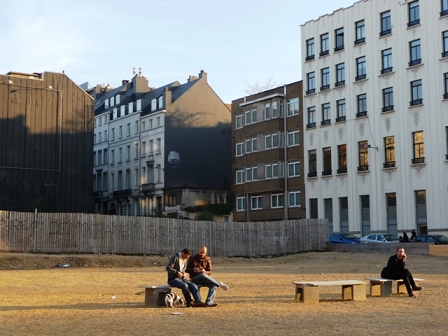
christian cummins
Last year's elections further polarized differences between the north south divide. Many of the 6 million Dutch speaking Flemings in the north of the country voted for the rightwing separatists Vlaams Belang, meaning 'Flemish Interest', and Nieuw-Vlaamse Alliantie, or ‘New Flemish Alliance’. The 4 million French speaking Walloons in the south voted largely for the left-wing pro-Belgium socialists. Since then there has been nothing but weak provisional governments without a mandate, a mutual recriminations. As the BBC's Jonty Bloom puts it: the Flemings and Walloons seem to have stopped talking to each other, or at least stopped listening to each other.
The crisis developed from an extraordinary impasse to a record one on the 17th of February, when Belgium broke the previous record of 249 days without a government. The record was previously held by Iraq which has been ridden with sectarian-strife. For a country like Belgium, which has long prided itself on tolerance and compromise, this was a moment of huge embarrassment and was sarcastically celebrated by a fed-up population. In the midst of the northern European winter, 249 students stripped off to mark the day. This being Belgium, free chips were handed out in the streets. Meanwhile a quiz show called Belgotron, has been launched, testing contestants knowledge of their homeland and offering the job of prime minister to the winner.
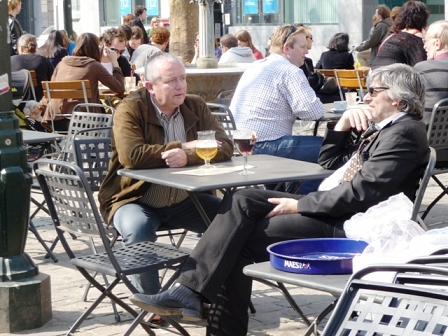
christian cummins
It's this mocking response and self-effacement that makes Belgium such a charming place to visit; in the words of writer Antony Mason "the Belgians are rather too ready to belittle themselves". But on the sun-kissed terrace of a Brussels café I met two young Belgians, from each side of the supposed linguistic fault line, who said the political crisis was really no laughing matter.
Josephine, from Dutch-speaking Flanders, said the situation made her angry. She refuses to read the news about Belgium any more since. She said it's just the same old politicians squabbling about the same old things. He friend Pascale, a French speaking Bruxelloise, said that although much of the country ran itself the paralysis was making life a misery for public workers who can't get salary increases and face long delays when implementing projects that require a minister's signature.
Did either of them feel Belgian? There are still car sticks proclaiming that the driver is "Belge et fier de l'être" - or “Belgian and proud of it” - and there is a facebook page of the same title, but these seem to be an act of defiance against the pervasive currents of the time.
"There's no 'Belgiumness' anymore," laughed, Josephine, "There's just chips and chocolate and beer."
She blames the media and particularly television. Dutch-language television concentrates only on Flemish matters and Flemish culture. The French-language television does the reverse.
"I don't know any famous Walloon singers or actors, and Pascale doesn't know any famous Flemish people. Culturally we have just drifted apart."
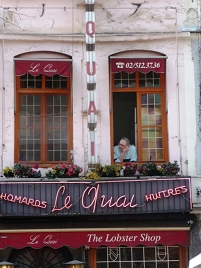
chris cummins
In the wake of the shared culture come stereotypes, the Walloons claim the Flemish, who are currently more successful economically, are mean and arrogant, the Flemish claim their southern neighbors are lazy and sucking up their taxes. It's like Italy all over again. The worst thing is that populist politicians appear to be propagating these regional clichés to win support and this is proving a major obstacle to progress
The slur of being poor and lazy is traumatic for the Walloons, for whom the past few decades have been cruel. The francophone area, home to heavy industry such as coal and industry, used to be the economic powerhouse of the country and the French speakers dominated political life.
Now that era of is over, leaving depressing landscapes of industrial ruin in Wallonia and 25.5% unemployment in towns like Charleroi. Since the 1970's the Flanders, once a rural backwater, has been enjoying a relative economic boom, having invested early and heavily in hi-tech industries. Now they have gained the ascendancy they are not keen in seeing their taxes go south.
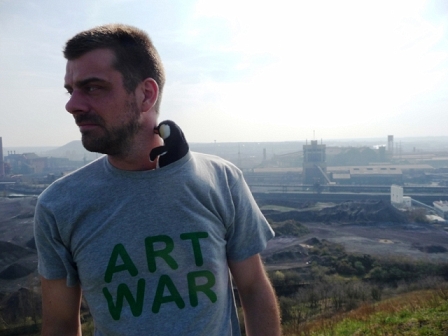
christian cummins
Nicolas Buissart, a 30 year old Walloon, who showed me around the rusting ruins and abandoned coal pits of Charleroi, says the Flemings have short memories: “It was this area that made Belgium rich and now they treat us like dirt.”
There is an irony in this strife that is much loved by Eurosceptics who choose to see Belgium's linguistic and cultural divisions as a microcosm of Europe's problems. Belgium is a country that hosts the European Union institutions which are working to create a continent of 500 million where linguistic and cultural divides as well as historical animosity are put aside in favor of mutual understanding and cooperation. And yet there the Belgians, the majority of whom are europhiles, can't achieve that in their homeland of just 10 million people. What better example, ask the skeptics, of the futility of the dream of a harmonious Europe.
What is life like in a country without a government? Surprisingly normal, it seems. Around the Grand Place I met Nicolette who says that the impact has been minimal because Belgium is prosperous and well-run bureaucratically. Power is heavily decentralized anyway in Belgium, says Nicolette “You should keep in mind that about 80% of legislation comes from the European Union so there is not much left. And Belgium is divided into three regions which deal with the hardware like houses and railroads.”
Nonetheless the provisional government with no mandate struggles to deal with key decisions on foreign policy, defense, national budget and debt issues and Nicolette misses something else:
“All the debate in the public sphere is about these two communities - the north and the south. That means the normal debate about issues like abortion and euthanasia are not carried out. I think that is bad for the country.”
The decentralization might help Belgium rumble on without a government with a mandate but Josephine thinks the complexity of the system is one of the key roots of the country's current woes. Each area has its own regional parliaments and parliaments for each language group as well. It is no wonder critics call the system "Balkanised." There are seven separate parliaments in all – although, when quizzed, even experienced politicians seem unsure of the exact number. They have so much autonomy that they can function quite well while having almost nothing to do with each other. It is easier to ignore those who disagree with you than it is to find common ground, but many Belgians feel this means they all ultimately lose out in the end. Josephine would like to take a big pair of scissors to the whole system and leave the country with just one parliament.
But Pascale disagrees, saying that the regional autonomy, which allows cultural differences flourish within a greater united system, has been instrumental in keeping together a country that was “invented” in 1830.
Inger, though not in favour of separatism, says there should be more not less autonomy. She says that people in the different regions voted for totally different things and so now they are under pressure from their voters to implement them and on a national scale that is going to lead inevitably to squabbling and intransigence. She hopes the impasse will end soon and says right now, with all these petty squabbles, it can feel embarrassing to be Belgian. But ultimately, she says, she is proud of her country where “you have a lot of freedom to make your own choices, we have great health care and the weaker members of society are well looked after.” There is much more to Belgium than just chips, chocolate and beer after all.
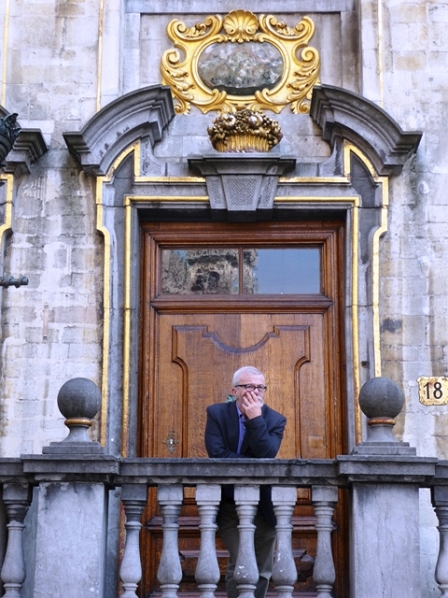
chris cummins
So what is the solution? Nicolette thinks that since the two leading parties – the Dutch-speaking New Flemish Alliance and the French speaking Socialist Party – can't find common ground, the parties that did less well should be given a chance to form a government.
“It's not really democratic,” she says, “but with so much of our legislation ceded to the European Union, it doesn't really matter.”


